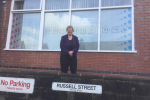I hope everyone has had a happy Easter and enjoyed, what is for most, a rare four-day break.
Making sure we have some down time is important to us all (whatever the weather!).
I was so pleased with my Government’s announcement that there would be a 10.1 per cent increase in the basic state pension this week.
This means that 12.5 million pensioners across the country will benefit from this increase, most especially including the 19,348 pensioners in South Derbyshire, and it will help them cope with the day-to-day increases in prices and other costs. As I have explained previously, the current inflation is a global issue caused mainly by the increase in energy prices following Russia’s invasion of the Ukraine.
The Government has been working to mitigate the effect this is having on those who are vulnerable in particular, and this announcement is another part of the work the Government is doing with millions of pensioners living on fixed incomes, making them particularly vulnerable to rising prices.
It seems some time ago that, after years of neglect of pensioners, the then Prime Minister David Cameron, when he won the election, introduced the triple lock to protect pensioners from their hard-earned retirement being blighted by a constant decrease in their state pensions by stealth, as the previous administration had let happen.
I am pleased that my government is continuing to live up to this promise – however difficult the times are. The Prime Minister, along with the Chancellor, is still working to halve inflation.
On another note, I remain sad that our junior doctors are now striking. My understanding was that doctors were paid well, arguably extremely well, alongside having a gold-plated NHS pension. This type of industrial action is disruptive for everyone – especially for those who had planned operations or appointments. It is really disappointing the BMA has chosen to cause maximum disruption for patients.
The BMA’s demand for a 35 per cent pay rise just to come to the table is unreasonable (and seems to be politically motivated rather than, as it should be, care for the NHS’s provision of healthcare for the country).
Then, of course, the BMA was actually against the formation of the NHS at the time. The cost of a 35 per cent pay rise from the public purse (at a time when most people are struggling) would cost £2bn per year and result in pay rises of over £20,000 for some junior doctors.
On a cheery note, I am very much looking forward to the Coronation, and there is a chance for us all to come together to celebrate our history, tradition and the stability that a constitutional monarchy brings the country. The peaceful transfer of power (if only power in name) is something to celebrate.



